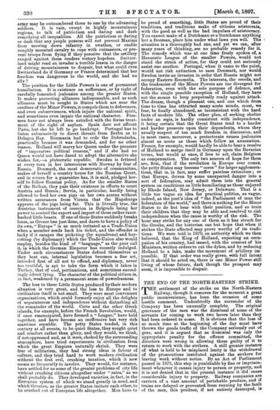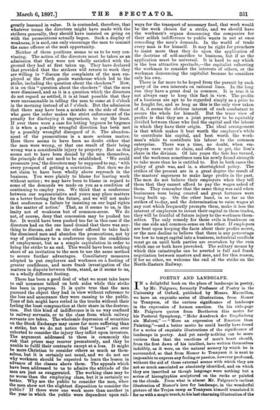THE END OF THE NORTH-EASTERN STRIKE. T HE settlement of the
strike on the North-Eastern Railway, though it removes for the moment a great public inconvenience, has been the occasion of some hostile comment. Undoubtedly the surrender of the Company has been unusually complete. The original grievance of the men was the dismissal of some of the servants for coming to work two hours later than they had been ordered to come. It is obvious that the loss of so much time at the beginning of the day must have thrown the goods traffic of the Company seriously out of gear, and it is argued that as dismissal was only the appropriate penalty for the offence committed, the directors were wrong in allowing those guilty of it to return to work with the strikers. A still greater instance of what is held to be misplaced lenity is the withdrawal of the prosecutions instituted against the strikers for leaving work without notice. By an Act of Parliament passed in 1875, this step is punishable by fine or imprison- ment whenever it causes injury to person or property, and it is not denied that in the present instance it did cause considerable injury to property. Railway companies are carriers of a vast amount of perishable produce, and if trains are delayed or prevented from running by the fault of the men, this produce, if not entirely destroyed, is greatly lessened in value. It is contended, therefore, that whatever terms the directors might have made with the strikers generally, they should have insisted on going on with the prosecutions actually begun. Such a display of weakness, it is said, can only encourage the men to commit the same offence at the next opportunity.
Neither of these positions seems to us to be very con- vincing. The action of the directors must be taken as an admission that they were not wholly satisfied with the ground they had at first taken up. They have declared that provided that the strikers will return to work they are willing to " discuss the complaints of the men em- ployed at the Forth goods warehouse which led to the strike, including the question about the checkers." Now, it is on this " question about the checkers " that the men were dismissed, and as it is a question which the directors do not regard as settled, it is at least possible that they were unreasonable in telling the men to come at 5 o'clock in the morning instead of at 7 o'clock. But the admission that there may have been a mistake on the side of those who gave the order makes the strict enforcement of the penalty for disobeying it ungracious, to say the least. If ever there were a case for letting bygones be bygones it is when a possibly wrongful direction has been met by a possibly wrongful disregard of it. The abandon- ment of the prosecutions is a more serious matter. Here there seems to have been no doubt either that the men were wrong, or that one result of their being wrong was a considerable injury to property. But as this seems not to have been denied by the men themselves, the principle did not need to be established. We could prosecute you,' the directors may be supposed to say, with every prospect of getting a conviction. But then we do not claim to have been wholly above reproach in the business. You were plainly to blame for leaving work without notice ; we may have been to blame in regard to some of the demands we made on you as a condition of continuing to employ you. We think that a conference between our representative and yours may place matters on a better footing for the future, and we will not make that conference a failure by insisting on our legal rights in the matter of notice.' That, as it seems to us, is the lenity not of weakness but of common-sense. We do not, of course, deny that concession may be pushed too far. It would have been pushed too far in this case if the directors had on the one hand denied that there was any- thing to discuss, and on the other offered to take back the dismissed men and abandon the prosecutions, not by way of preliminary to a conference upon the conditions of employment, but as a simple capitulation in order to bring the strike to an end. This would have been nothing short of an invitation to the men to use the same method to secure further advantages. Conciliatory measures adopted to put employers and workmen on a footing of greater confidence, and more frank investigation of the matters in dispute between them, stand, as it seems to us, on a wholly different footing.
There has been a good deal of what we must take leave to call nonsense talked on both sides while this strike has been in progress. It is quite true that the men pursued the object they had in view without reference to the loss and annoyance they were causing to the public. Tons of fish might have rotted in the trucks without their feeling the least compunction at their share in the destruc- tion. But this kind of indifference is in no way confined to railway servants, or to the class from which railway servants are taken. The wholesale depression of securities on the Stock Exchange may cause far more suffering than a strike, but we do not notice that " bears " are ever exhorted to consider the injury they inflict upon investors. The argument addressed to them is commonly the risk that prices may recover prematurely, and they be unable to fulfil their contracts except at a loss. It might be more Christian to consider others as much as them- selves, but it is certainly not usual, and we do not see why workmen should be expected to learn the lesson in advance of the classes above them. The appeals which have been addressed to us to admire the attitude of the men are just as exaggerated. The working class may be no worse than the employing class, but it is certainly no better. Why are the public to consider the men, when the men show not the slightest disposition to consider the public? If there were one week more than another in the year in which the public were dependent upon rail- ways for the transport of necessary food, that week would be the week chosen for a strike, and we should have the workmen's organs denouncing the companies for their selfish indifference to public wants in not at once conceding the men's demands. In the world of trade every man is for himself. It may be right for preachers to insist more than they do upon the application of the doctrine of self-sacrifice to business, but if so the application must be universal. It is hard to say which is the less attractive spectacle,—the capitalist exhorting the workman to consider the interests of others, or the workman denouncing the capitalist because he considers only his own.
There is far more to be hoped from the pursuit by each party of its own interests on rational lines. In the long run they have a great deal in common. It is true it is not always easy to keep this fact in view. The profits of a business are apt to be regarded simply as a prize to be fought for, and so long as this is the only view taken of it, it seems the obvious interest of each combatant to secure the whole for himself. But the truer view of profits is that they are a joint property to be equitably divided between those who find the capital and the labour in which they have their origin. The ideal arrangement is that which makes it best worth the employer's while to contribute his capital, and best worth the work- man's while to contribute his labour to the common enterprise. There was a time, no doubt, when em- ployers were wont to claim, and often to get, the lion's share in the division. Of late years the tide has turned, and the workman sometimes uses his newly found strength to take more than he is entitled to. But in both cases the policy of grab was, and is, a shortsighted policy. The strikes of the present are in a great degree the result of the masters' eagerness to make large profits in the past. The men do not believe their employers when they tell them that they cannot afford to pay the wages asked of them. They remember that the same thing was said when businesses were being created and great fortunes were being built up. On the other hand, in so far as the strikes of to-day, and the determination to raise wages at any cost which frequently prompts them, make it less the interest of employers to invest their capital in these trades, they will be fruitful of future injury to the workmen them- selves. The only remedy for these evils is frankness on the one side and common-sense on the other. If employers are bent upon keeping the facts about their profits secret, or the men decline to believe that there is any percentage too low to tempt capital into a business, industrial conflicts must go on until both parties are overtaken by the ruin which one or both have provoked. The solitary means by which this catastrophe can be averted is full and frank negotiation between masters and men, and for this reason, if for no other, we welcome the end of the strike on the North-Eastern Railway.







































 Previous page
Previous page